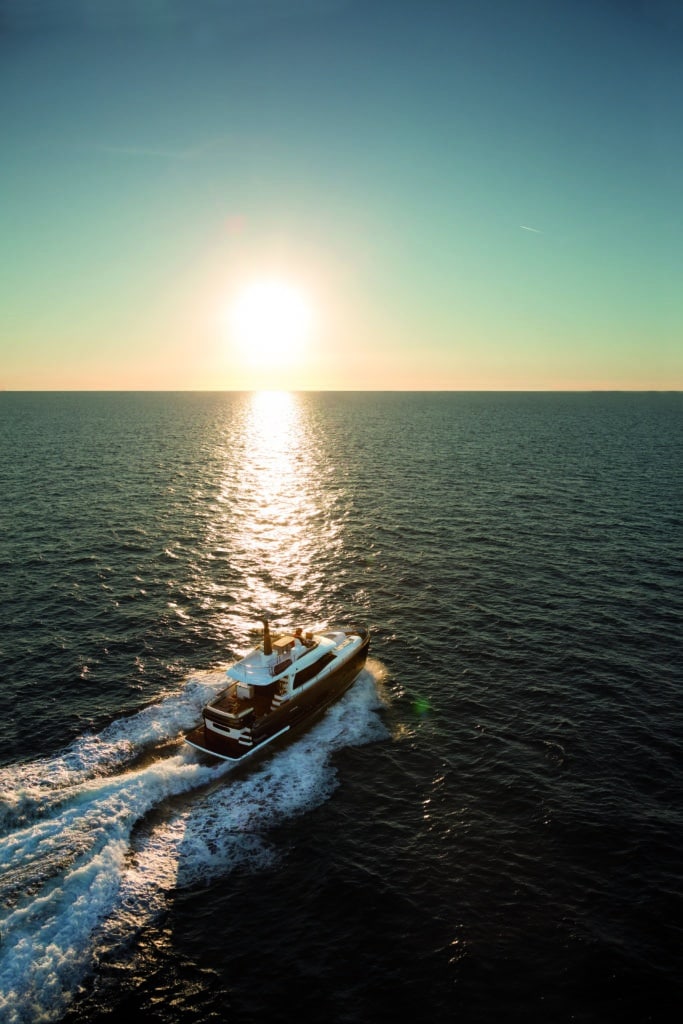
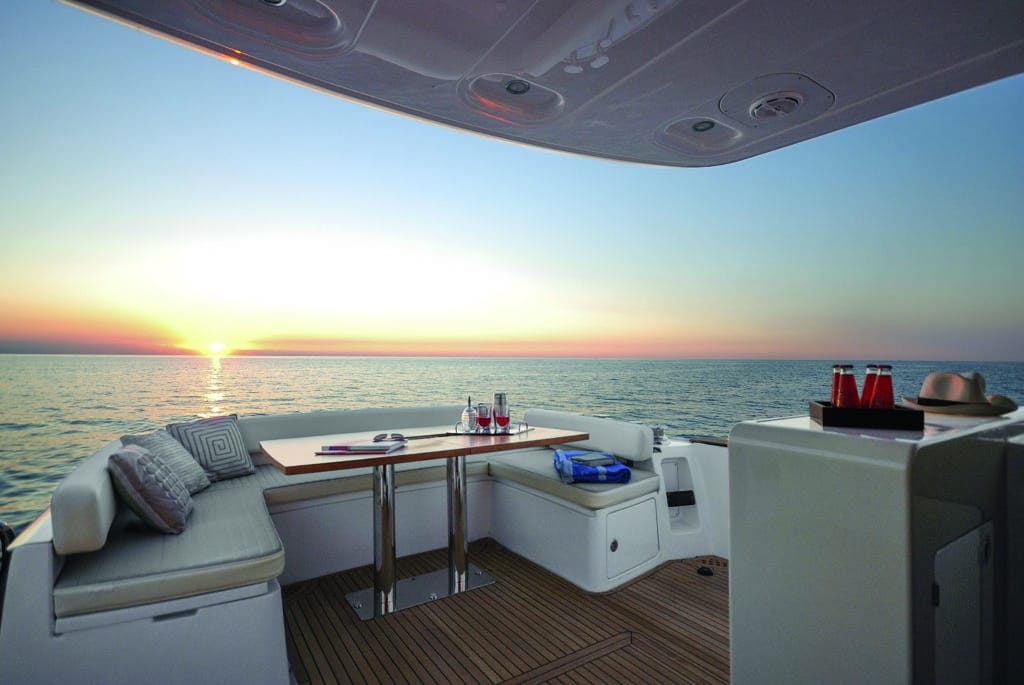
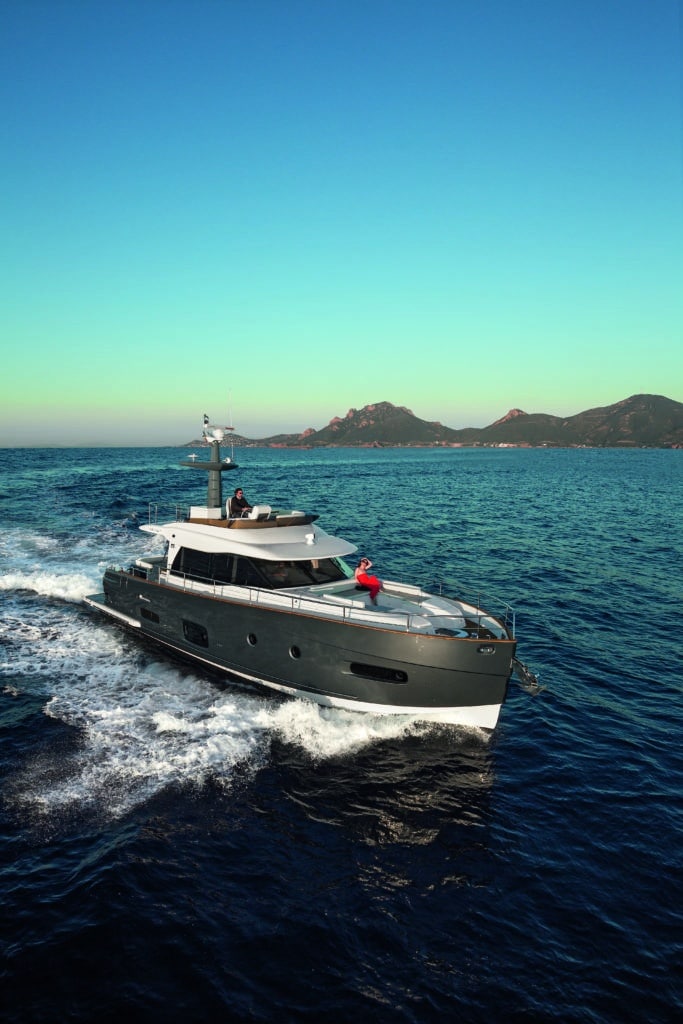
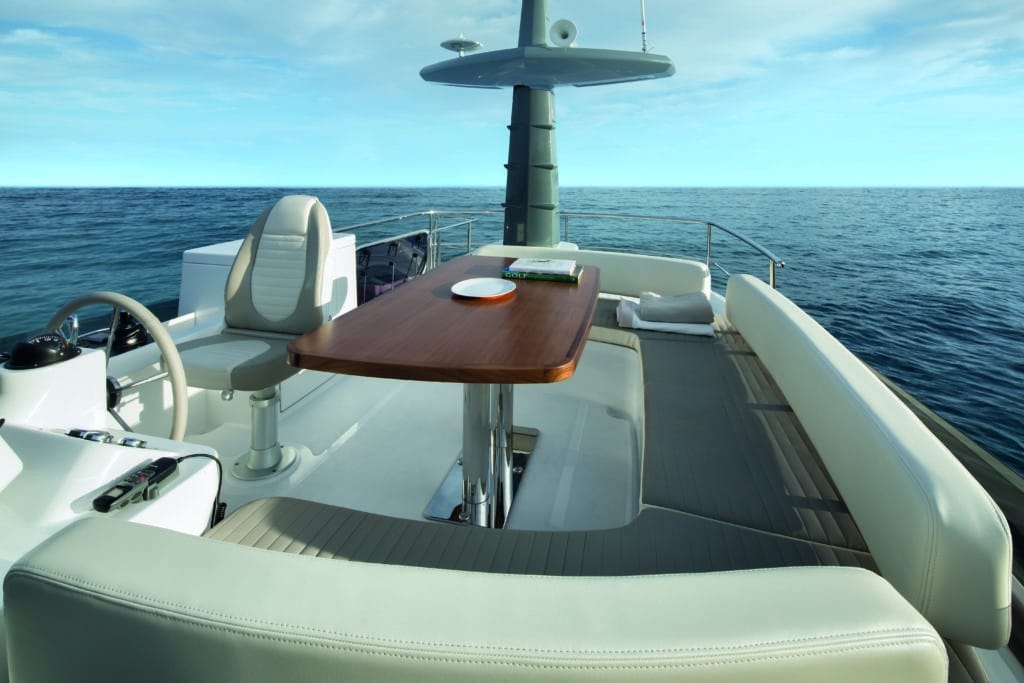
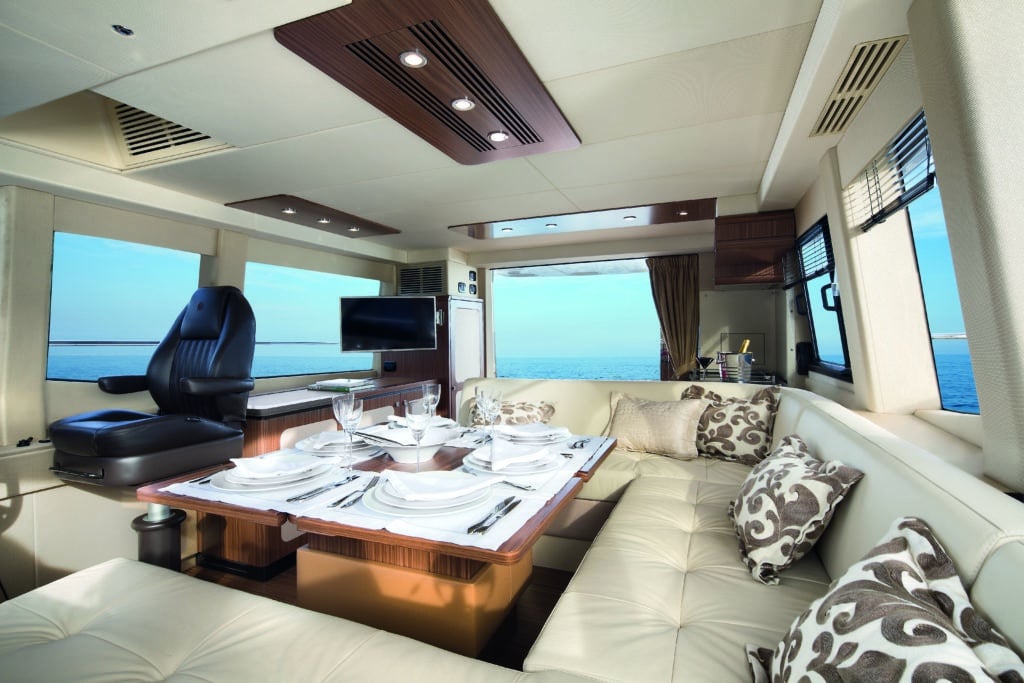
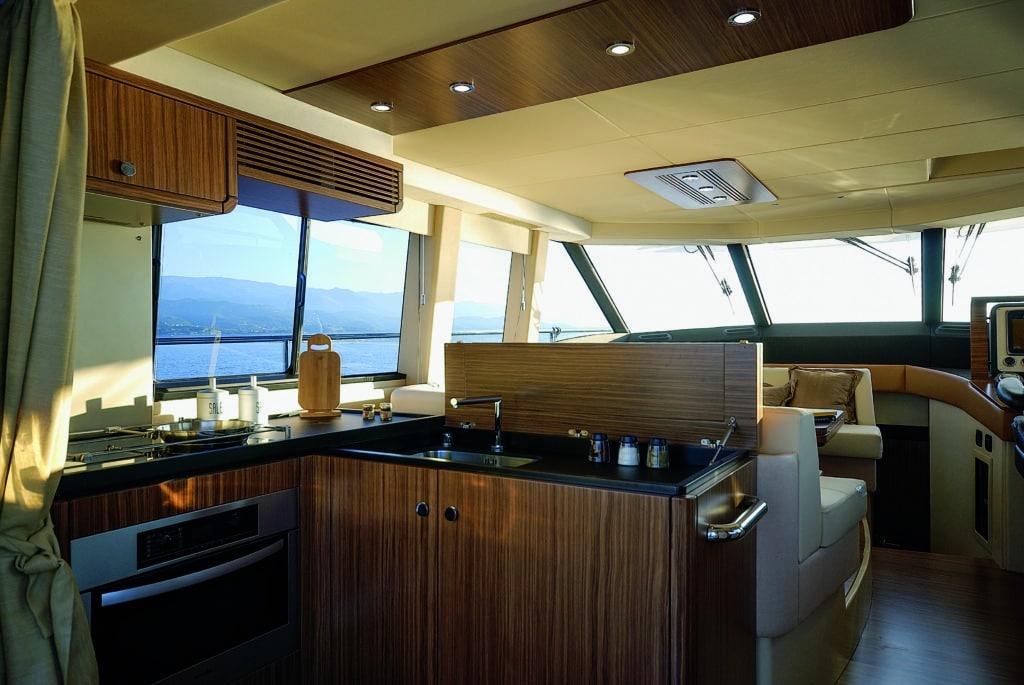
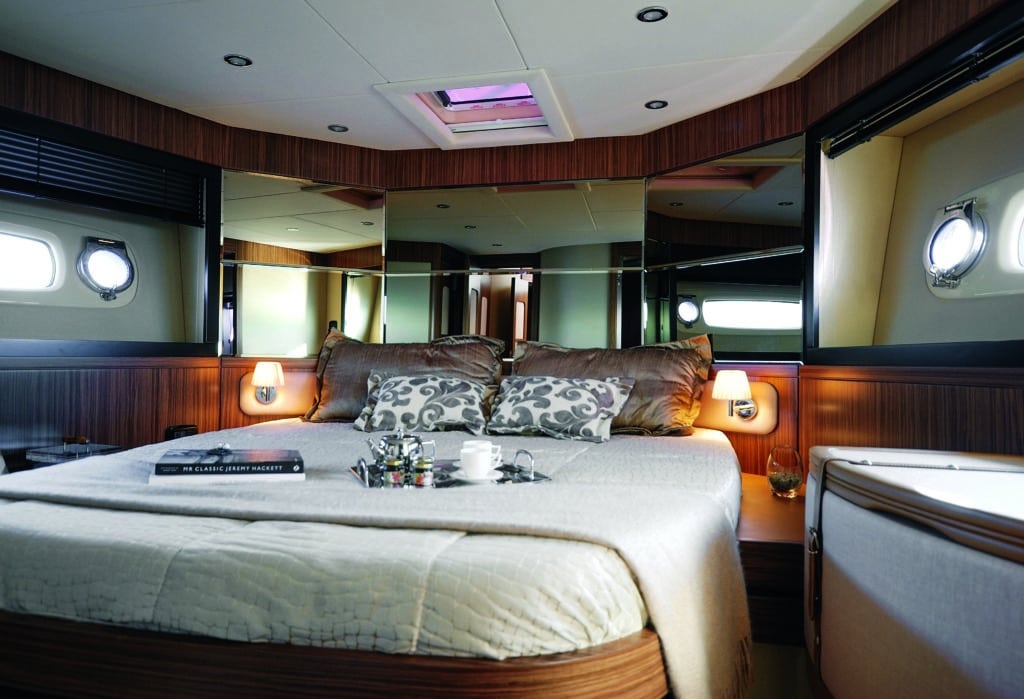
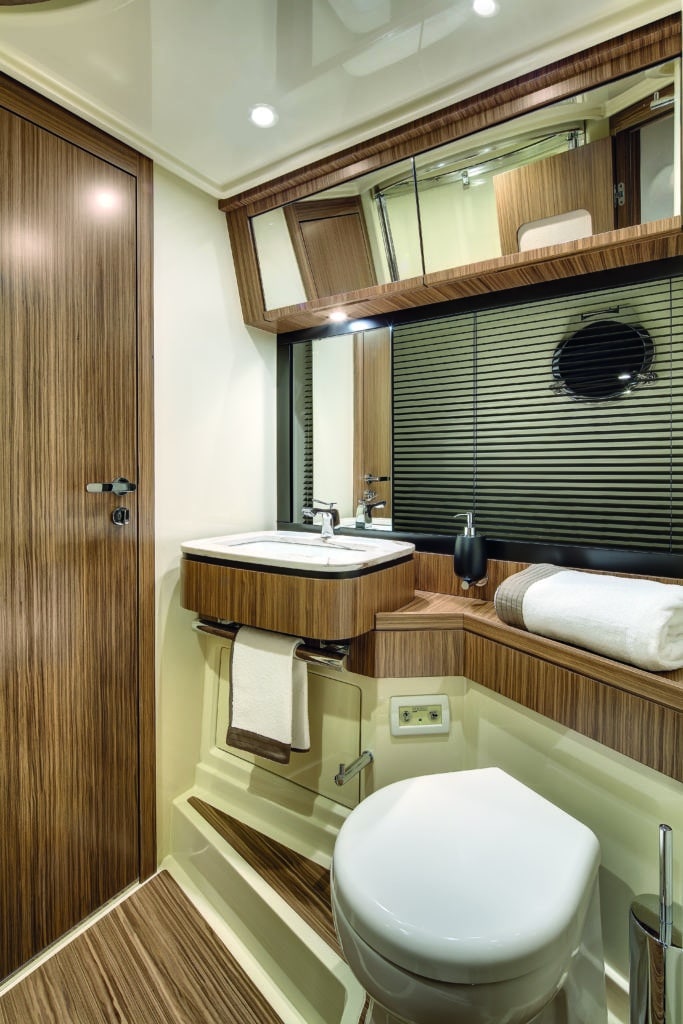
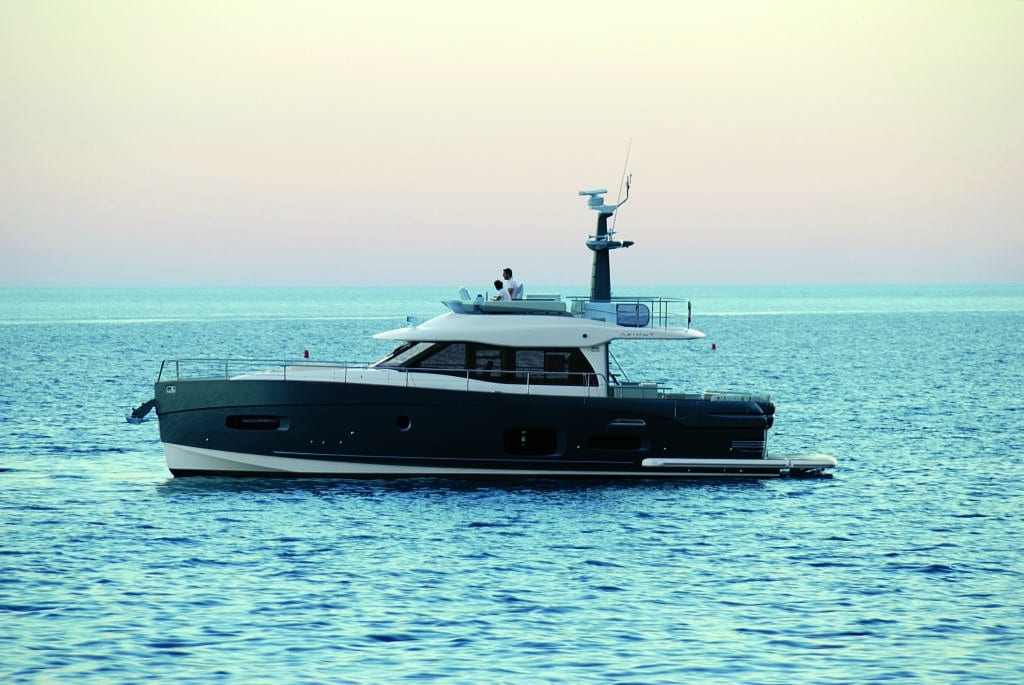
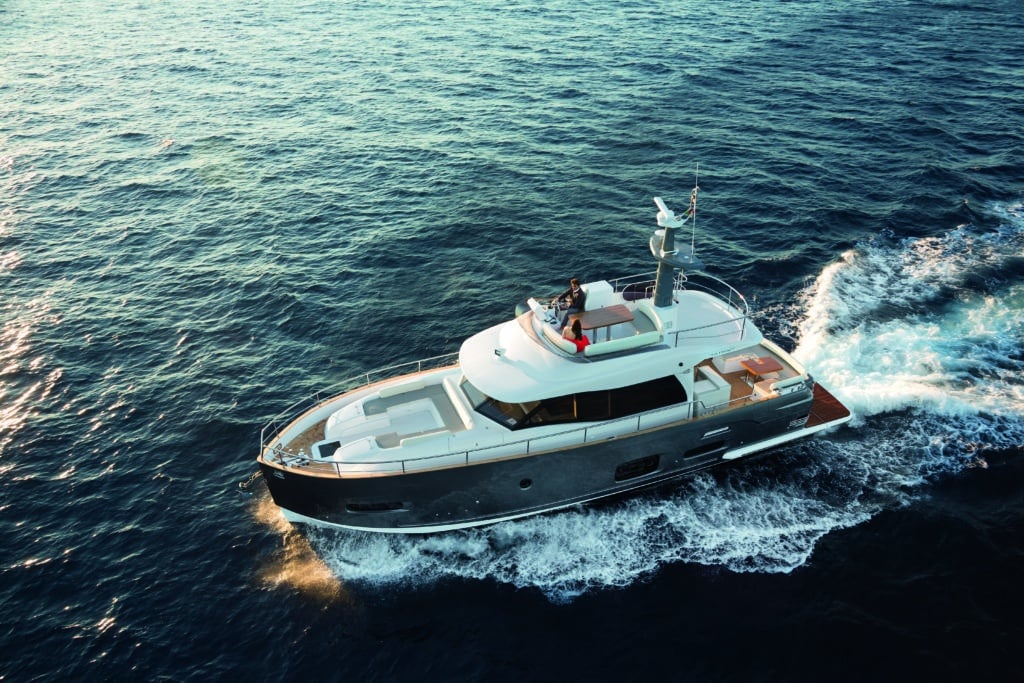
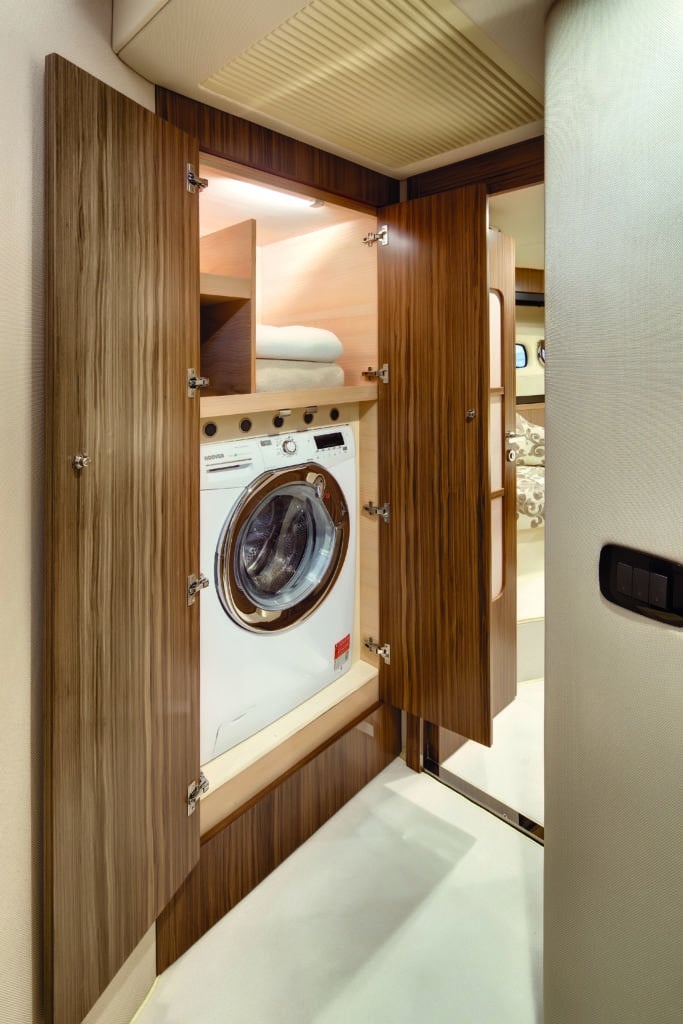
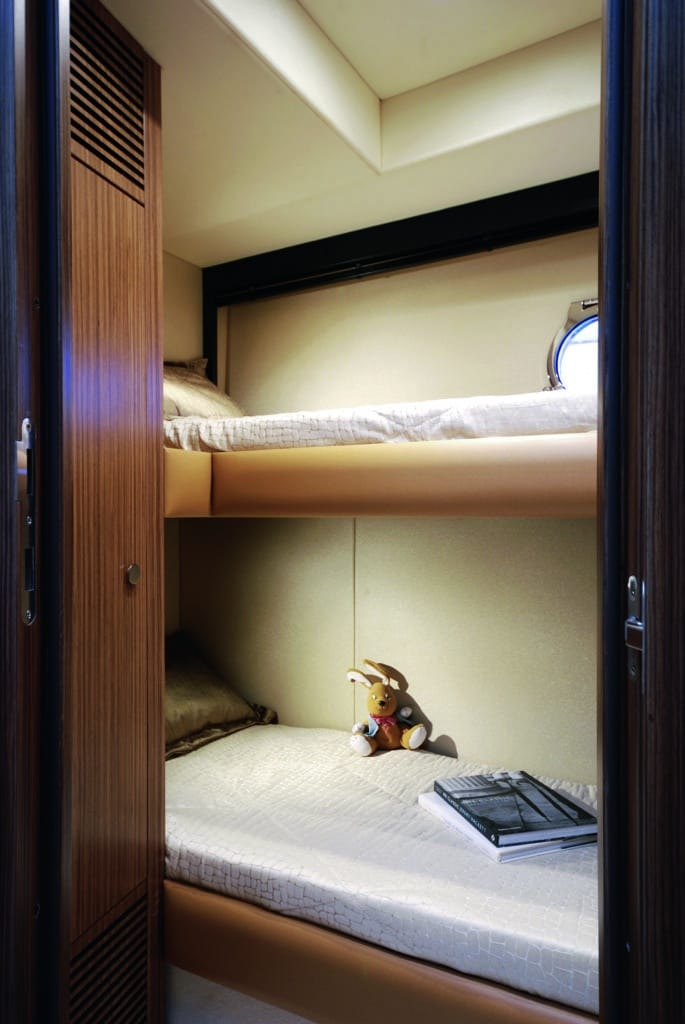
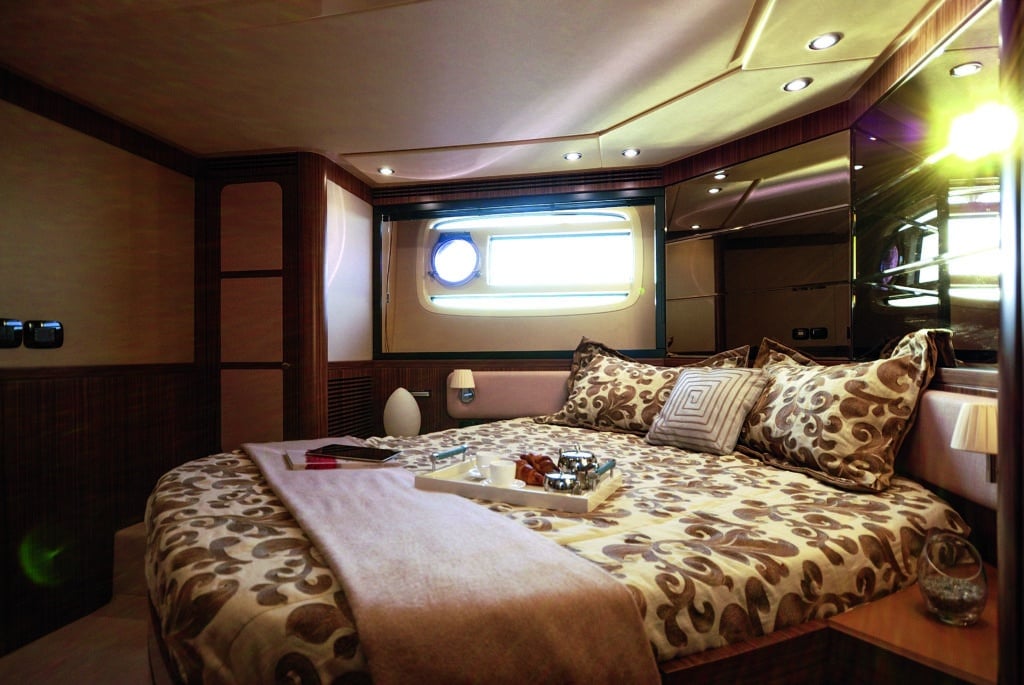
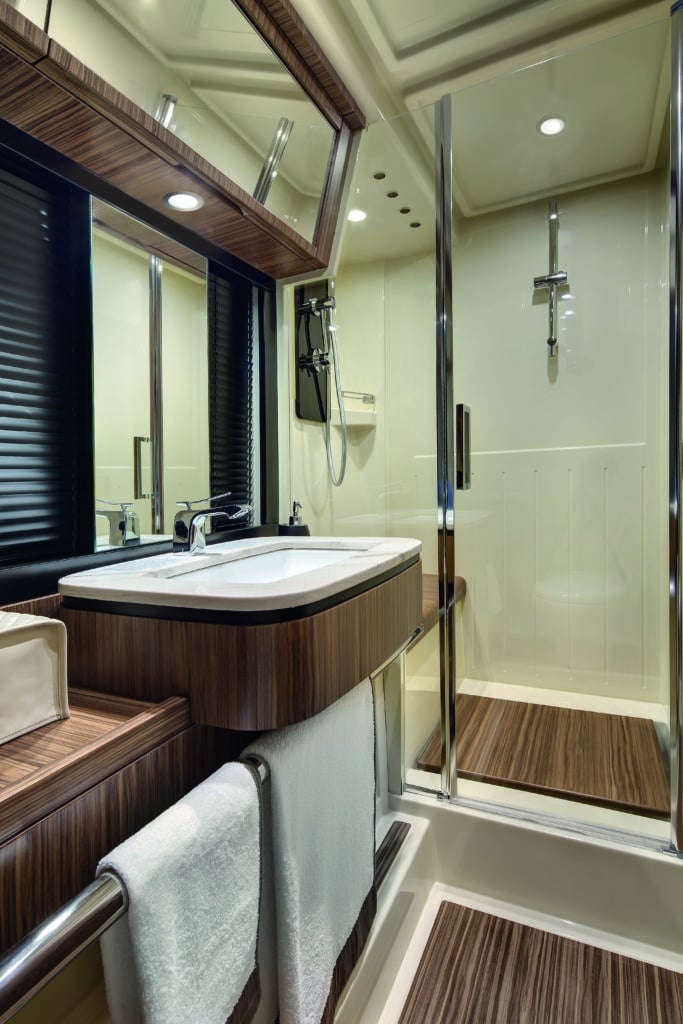
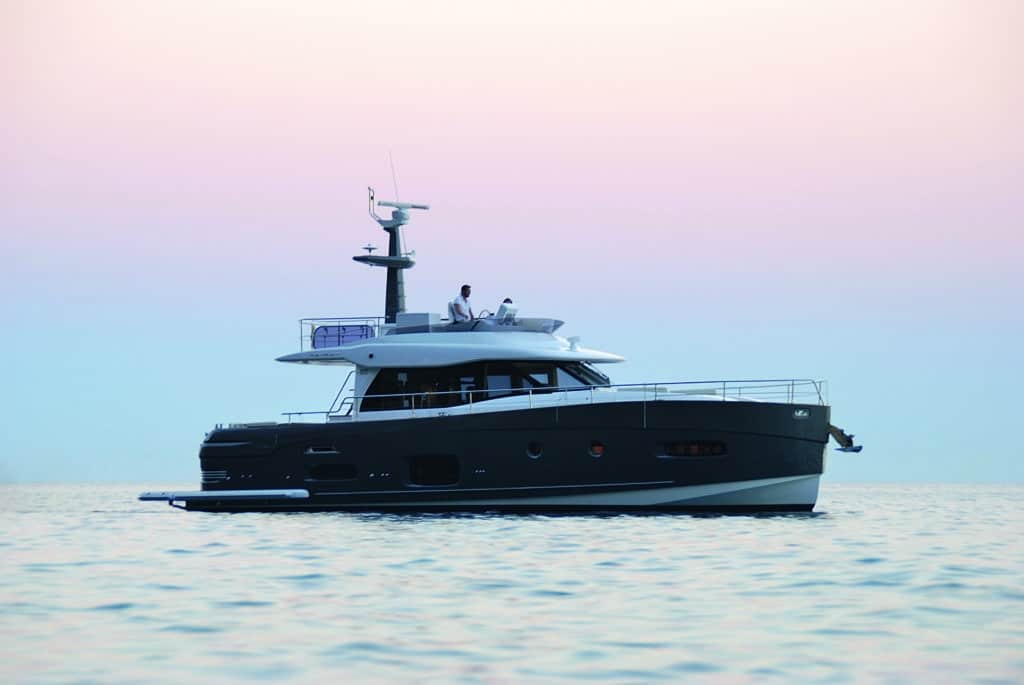
When [Azimut][] launched the Magellano 53 in September, the boat became the second generation of the builder’s long-range series. The first Magellano, a 50-footer, made her debut in 2010, but Azimut felt compelled to make significant external and interior changes to the line, partly based on owner feedback but also because it wanted to add a captain’s cabin on the 53. The 3 extra feet not only supersized the cockpit to 140 square feet (an increase of 6-plus square feet from the 50) and seamlessly added the transom cabin, but it also gave the 53 a longer, more elegant profile. She shares the Magellano 50’s family resemblance, with a straight bow and high bulwarks, and the longer 53 will satisfy owners who like explorer features but want a craft a bit more proportional to its length overall.
Of course, the Magellano line was originally designed to be a hybrid — with more curves than most trawlers but not quite as many as on flybridge motor-yachts. Even the 53’s “dual-mode” hull, designed for efficiency at both displacement and planing speeds, has a distinct shape with a 17-degree deadrise amidships that transitions to a relatively flat 8 degrees at the transom.
This multipurpose design might signal compromises on some boats, but it works on the Magellano 53, especially with the updated elements. “We solicited feedback from our owners and then thought carefully about everything one would bring on a boat for a long cruise,” says Federico Lantero, Magellano’s brand manager. “Besides the captain’s cabin, we built much more storage across the boat, in both [the] exterior and interior. The layouts are more strategic now.”
That strategy included converting a fourth stateroom into a dedicated stowage area with built-in wooden shelves, but with enough open space to lay down a single berth in a pinch. Another big addition was the captain’s cabin at the stern, designed to appeal to owners who like the Magellano’s look but who may not want to run the boat themselves. The idea is to convert two types of owners: those who want to put serious miles beneath their boat’s hulls with their own navigational skills, and those who want to look like they do.
The 53 has an attractive overall look with a bluish-gray hull, white topsides and a gray radar mast (which signals its status as a serious offshore boat). And her contoured superstructure, which sits amidships rather than forward as on most trawlers, provides a sweeping foredeck.
But she’s no pretender, either. My test boat was equipped with Raymarine’s open-array HD radar, which has a 72-mile range and delivers a clear picture in varied conditions; Xenta joystick controls (bow thrusters are standard, and stern thrusters are optional); Seakeeper stabilizers; and electric mooring winches for the Williams 325 tender.
Her sea trial revealed that the 53 has a mini-explorer’s DNA at her core. The Golfe de la Napoule off Cannes, France, was running a mere 1 to 2 feet, but we were able to get a taste of how the 53 should perform. The day was warm, so I drove from the flybridge where I could spot low-lying sea kayaks and other small boats with ease. This yacht’s starboard-side helm offers unobstructed visibility in all directions, and the helm console includes a Raymarine eSeries display, Raymarine VHF, oversize sailboat-style steering wheel and, on the right, throttles for the 500-horsepower Cummins diesels and Xenta joystick for tight- quarters maneuvering.

I first ran the 53 in displacement mode at about 8 knots, and those diesels consumed only 6.5 gph, giving this yacht a range of 1,300 nm. I did some tight circles to generate a confused chop, and the 53 went through it without slamming and while tracking true. Bumping up the throttles and bringing her to 16.2 knots at 2,100 rpm pushed the fuel burn to 31.6 gph and reduced range to about 350 nm. At her top end of 22.8 knots, those Cummins engines gulped 50.8 gph, but it’s not an outrageous number if you’re in a hurry to get back to port.
The flybridge has a 7-foot-10-inch by 5-foot-7-inch lounge to port, with a wet bar abaft the helm seat. The area behind the radar mast has open space for an 11-foot tender, room that could become a separate sunning area if the owner prefers to keep the tender on the 14-by-4-foot hydraulic swim platform. Azimut incorporated a shower onto the radar mast, perhaps with that in mind, although the area could also use stereo speakers.
Azimut, which is promoting its Italian heritage, was probably thinking about styling and construction when Magellano adopted the tagline “The New Italian Long Range.” I connected the expansive social areas with big gatherings of family and friends, Italian-style, not only on the bridge, but on the foredeck and in the cockpit too.
Increasing the size of the cockpit provides more space, and the designers turned it into a full-blown outdoor terrace with a 6-foot-6-inch by 5-foot lounge with a teak table and a fiberglass bar that incorporates a sink, electric grill, ice maker and two chairs. An optional awning shades the lounge.
The foredeck, usually designed as the business end of mini-explorer yachts, has another well-thought-out gathering point. It has a U-shaped lounge with the main seat spreading almost 8 feet across and the wing sides moving almost 5 feet forward until they both connect with stowage lockers. The designers left a sizable amount of space at the forepeak to work the anchor and lines.
| Specifications | Builder Supplied Number |
|---|---|
| LOA: | 55’5′ |
| BEAM: | 15’5″ |
| DRAFT: | 4’9″ |
| DISPL.: | 63,052 lb. (dry) |
| FUEL: | 845 gal. |
| WATER: | 185 gal. |
| DEADRISE: | 8 degrees |
| ENGINES (tested): | 2 x 500 hp Cummins QSB 8.3L diesels |
| BASE PRICE: | $1,485,000 |
This craft’s social element continues into the salon, which provides an unbroken line of sight from the door through to the forward windshield even though the room is effectively divided into two spaces. The cream-color fabrics and light-hue headliner, combined with 360-degree banks of windows and 6-foot-6-inch headroom, give the area a spacious feeling. The 53’s walnut cabinets and accent give the salon, especially near the galley, an at once Old World, yet contemporary, feel. And that’s no easy task. But the designers also incorporated synthetic materials across the interior for durability. “We used a natural material in the past that was not easy to clean,” comments Lantero.
The phrase “easy living” comes to mind on this boat. You can see the quality in the fit and finish, but it’s never over the top in terms of luxury. There’s a high, understated standard of design.
A full-featured galley with a four-burner Miele stove, Miele oven and tall Vitrifrigo fridge works in sync with the forward lounge to port, but remains in the backdrop. The lounge accommodates eight people, but instead of building a huge table that restricts movement, Azimut installed a four-leaf table that doubles in size when owners and guests need the room. A single-person helm seat sits forward and to starboard, with a walnut backdrop that houses the Raymarine console, gauges and leather-wrapped wheel. The throttles are positioned to the right, at elbow height, and a second Xenta joystick is just forward. The helm area features a window that opens for fresh air.
Six 24-inch-wide steps bring you below to an atrium and a nice view up through the windshield. Azimut made good use of available space on the lower deck, designing three staterooms and the fourth area for stowage. The unit has built-in okume-wood shelves, left unfinished as part of the rustic nature of the boat, Lantero says. Owners can choose to finish the wood and use the space as a fourth stateroom. On my 53, there was a washer/dryer in this area.
The third, smallest stateroom has pullman berths and its own shower. The room is tight and a bit dark, with a single porthole, but it works fine for children or weekend guests. A separate head is connected with two doors, one to the foyer and the other to the forepeak VIP stateroom.
| RPM | KNOTS | GPH | dB(A) |
|---|---|---|---|
| 600 | 3.8 | 1.0 | 56 |
| 1000 | 6.7 | 2.4 | 57 |
| 1500 | 9.6 | 13.0 | 65 |
| 1800 | 11.2 | 22.2 | 66 |
| 2100 | 16.2 | 31.6 | 72 |
| 2400 | 20.0 | 39.6 | 73 |
| 2650 | 22.8 | 50.5 | 73 |
As promised, the VIP cabin has excellent stowage under the berth, in a hanging locker and inside a stylized “trunk” that looks like it belongs on the first-class cabin of a 1930s ocean liner. Mirrors over the head of the berth lighten up the room, while the overhead hatch and large hull-side windows provide good natural light.
The real sweet spot belowdecks is the 53’s full-beam master stateroom. At its maximum, headroom is almost 7½ feet, and minimum headroom is still 6 feet 7 inches. The double berth is positioned at an angle, facing the center-forward portion of the boat. It’s a nice geometric touch, freeing up walk-around space on both sides of the berth (rather than it jutting straight across the room) and adding to a general sense of spaciousness. Once again, underberth stowage and a walk-in closet are standard.
An en suite head along the port side runs the length of the cabin. Teak flooring in the shower and a designer sink add a sense of refinement. Having the head situated against the hull also gives it a private window on the water.
What was my final impression of Azimut’s Magellano 53? The designers kept the essentials that make her a solid voyager and made noticeable improvements over her predecessor where it counts for live-aboards — in small areas that add up to extra quality of life at sea. The 53 is a fresh take on the explorer yacht, standing apart from the crowd in a very good way.
Room For One More
The captain’s cabin is one of the focal points on Hull No. 1 of the Azimut Magellano 53. It’s an option, but it is one of the main changes in the Magellano line. Azimut realized some owners would prefer a captain, especially for passagemaking. The cabin blends seamlessly with the yacht’s profile, and its entrance hatch is hidden under a seat in the cockpit lounge. The cabin is not a space for more than a person and was really designed for sleeping. But it’s self-contained with a berth, a sink and a toilet. A rear window keeps the area ventilated, and panels on the bulkhead let the captain access the hydraulic swim platform, if necessary. At an owner’s request, Azimut can install displays and gauges inside the cabin to monitor the boat’s systems. The room’s placement at the transom leaves a buffer between the captain and owners, allowing for early morning maintenance without having to enter the cabin. Of course, owner-operators can also choose to make this area a large stowage compartment.









